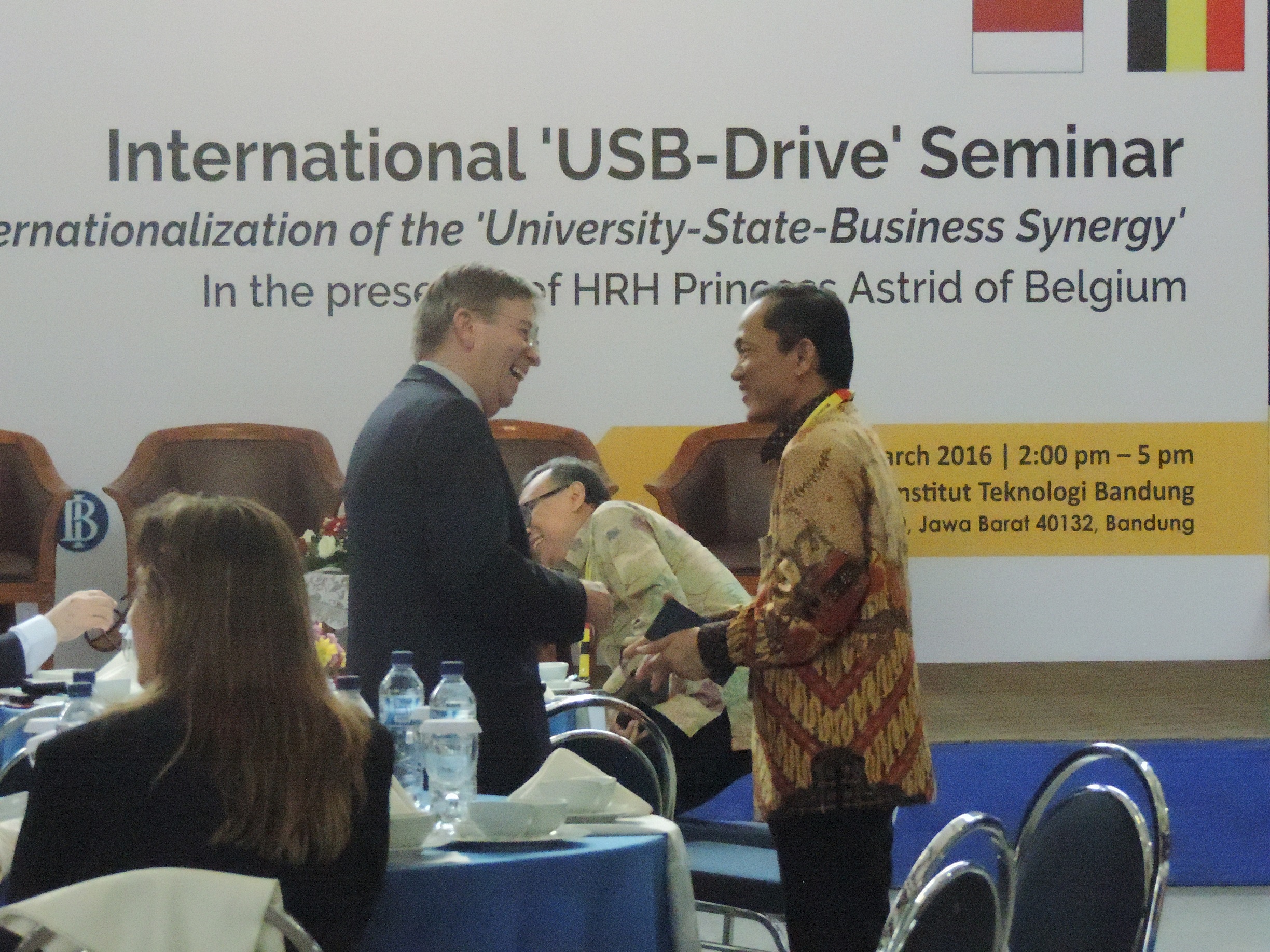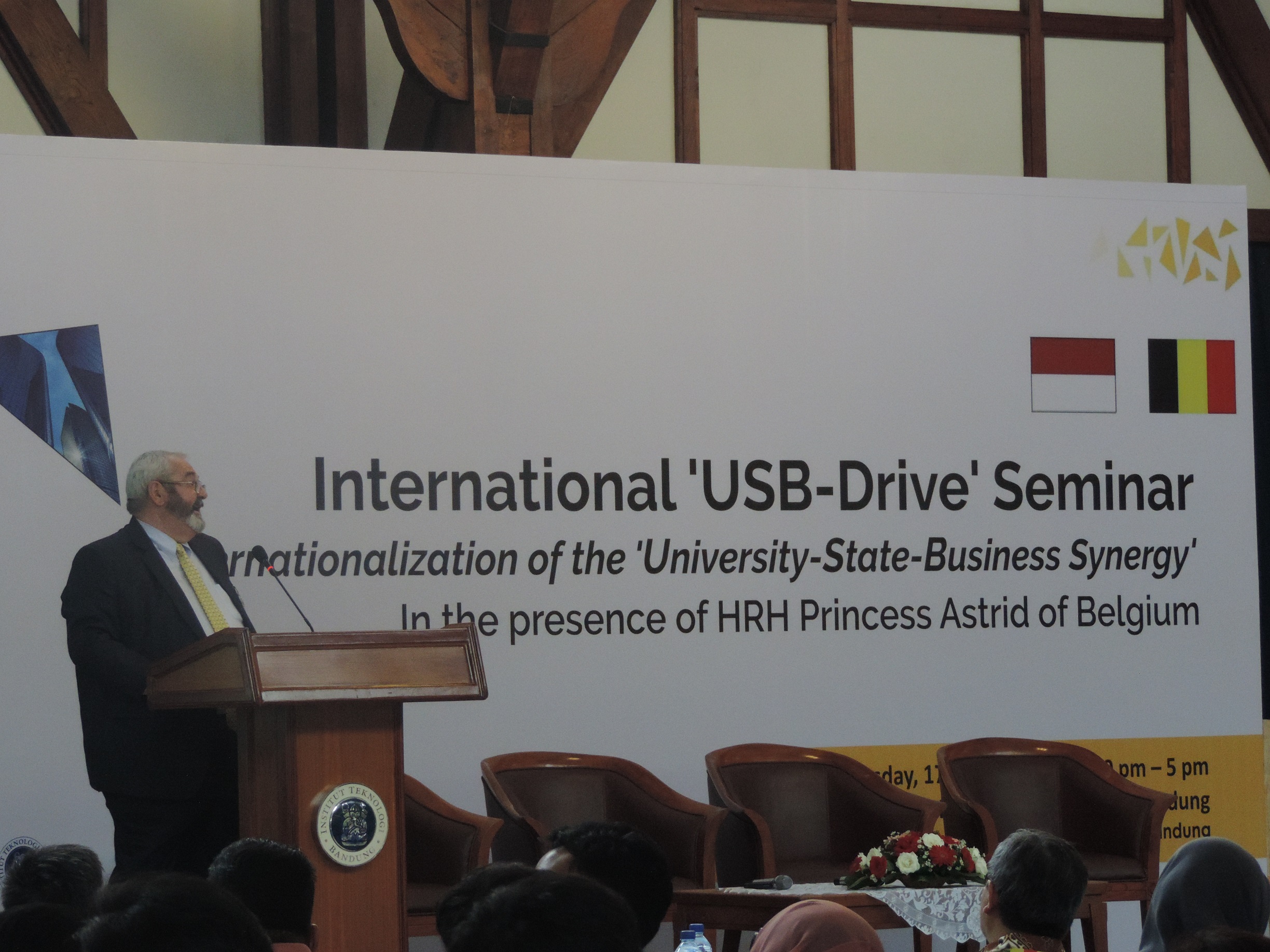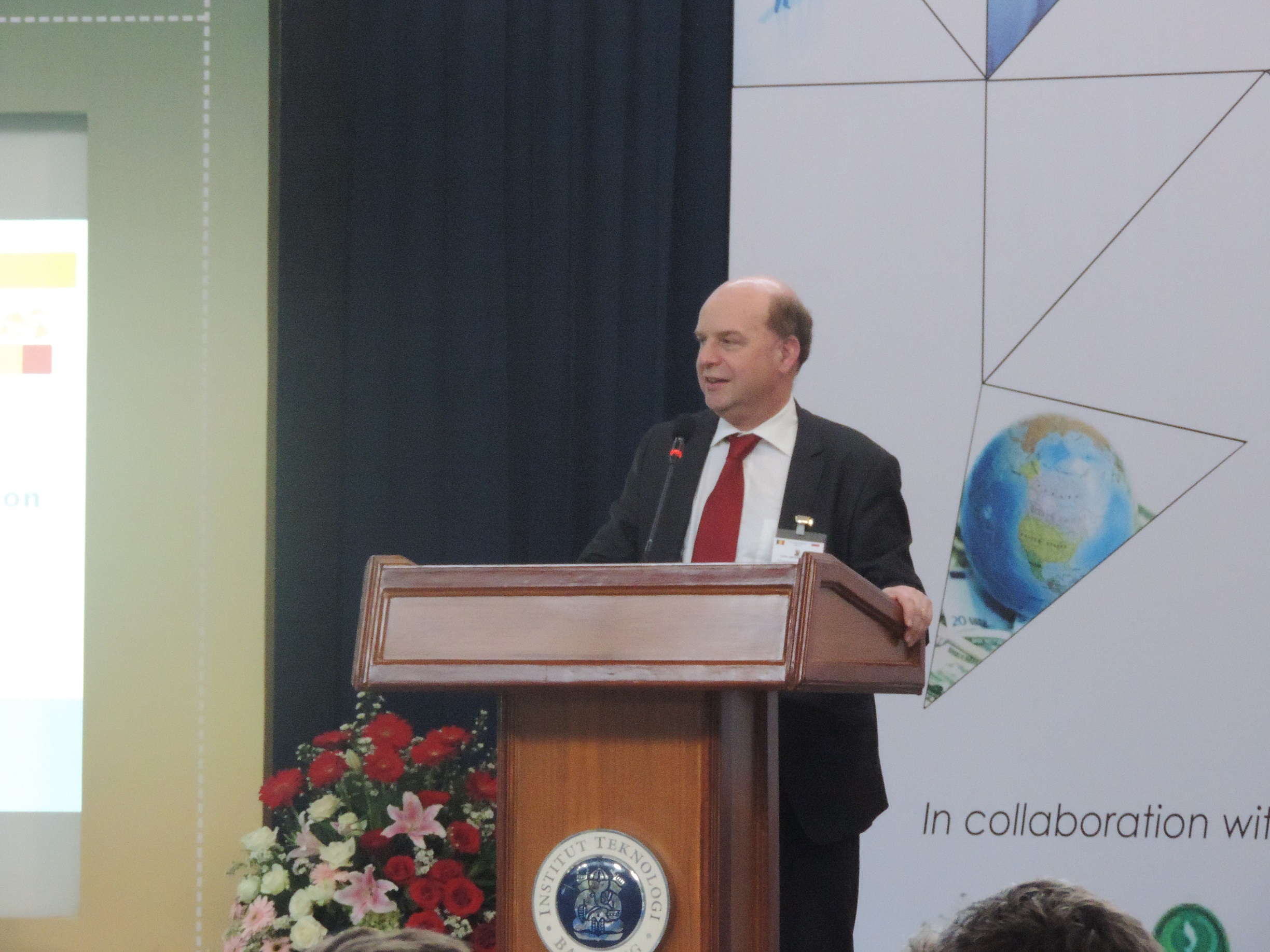Increasing International Cooperation, Queen of Belgium Attended Seminar on Innovation at ITB
By Yasmin Aruni
Editor Yasmin Aruni

 BANDUNG, itb.ac.id - Progress and independence of a country can't be separated from innovation. In order to push innovation in various aspects, there are three parties that should work together as a triple helix: university, state, and entrepreneurs. As an institution of higher education, ITB contributes to the country by continuing to innovate with the state and employers. International Seminar (University - State - Business) USB-Drive on Thursday (17/03/16) organized by ITB in collaboration with the Wallonia Export and Investment Agency (AWEX), Universiteit Gent and Universiteit de Liege. Located in the West Hall ITB, the seminar was filled and attended by various stakeholders in the triple helix innovation. In addition, the presence of princess Astrid of Belgium add knowledge of the participants on the importance of the internationalization of the university.
BANDUNG, itb.ac.id - Progress and independence of a country can't be separated from innovation. In order to push innovation in various aspects, there are three parties that should work together as a triple helix: university, state, and entrepreneurs. As an institution of higher education, ITB contributes to the country by continuing to innovate with the state and employers. International Seminar (University - State - Business) USB-Drive on Thursday (17/03/16) organized by ITB in collaboration with the Wallonia Export and Investment Agency (AWEX), Universiteit Gent and Universiteit de Liege. Located in the West Hall ITB, the seminar was filled and attended by various stakeholders in the triple helix innovation. In addition, the presence of princess Astrid of Belgium add knowledge of the participants on the importance of the internationalization of the university.
Build Optimal Atmosphere for Innovation
 USB-Drive seminar was opened by the Rector of ITB, Prof. Dr. Ir. Kadarsah Suryadi, DEA, which explained ITB's status and plans in education. Towards the title of world-class university, ITB continues to build its readiness. "ITB has raised the standard of 20 departments to became internationally accredited majors," said Prof. Kadarsah. The second speaker was Prof. Dr. Vet. Pascal Leroy, Vice Chancellor ULG, Belgium. Prof. Pascal elaborated on what is done by ULG in an atmosphere that supports the creation of innovation on campus. Universiteit Gent, Belgium, Prof. Guido Van Huylenbroeck (Vice President for International Relations Gent University) convey knowledge about the ecosystem of innovation and technology transfer at the university in order to bridge the gap between research and innovation. Based on the information provided bt Prof. Guido, there are three things that make up the ecosystem of innovation, namely people, partners, and proximity. Good human resources is a mandatory requirement for an innovation. On the other hand, cooperation with colleagues are also required to produce an innovative work. According to Prof. Guido, funding remains a major obstacle in a study, because a researcher must make sure that someone will pay for a sustainable research.
USB-Drive seminar was opened by the Rector of ITB, Prof. Dr. Ir. Kadarsah Suryadi, DEA, which explained ITB's status and plans in education. Towards the title of world-class university, ITB continues to build its readiness. "ITB has raised the standard of 20 departments to became internationally accredited majors," said Prof. Kadarsah. The second speaker was Prof. Dr. Vet. Pascal Leroy, Vice Chancellor ULG, Belgium. Prof. Pascal elaborated on what is done by ULG in an atmosphere that supports the creation of innovation on campus. Universiteit Gent, Belgium, Prof. Guido Van Huylenbroeck (Vice President for International Relations Gent University) convey knowledge about the ecosystem of innovation and technology transfer at the university in order to bridge the gap between research and innovation. Based on the information provided bt Prof. Guido, there are three things that make up the ecosystem of innovation, namely people, partners, and proximity. Good human resources is a mandatory requirement for an innovation. On the other hand, cooperation with colleagues are also required to produce an innovative work. According to Prof. Guido, funding remains a major obstacle in a study, because a researcher must make sure that someone will pay for a sustainable research.
 To supervise the management of innovation, ITB has a separate institution, the Institute for Innovation and Entrepreneurship Development (LPIK) ITB. Dr. Leo Aldianto of LPIK ITB gave a presentation about the role of Innovation Park to strengthen the innovation ecosystem. "It will contain work incubator, startup companies, and entrepreneurial development for Innovation Park," said Dr. Leo. ITB will build Innovation Park not only as a vehicle for the community, but also for entrepreneurs and researchers. "The number of startup companies in Indonesia will provide a more stable economic growth for the country," added Dr. Leo. Turning to the researcher, Robert Renaville, CEO of Progenus, talk about the spin-off at the University de Liege. Progenus itself are spinoff company engaged in DNA and bioinformatics. According to Robert, the development of spin-offs in the early months depending on the capitalization of companies and guidance from the university in management, business analysis, commercial strategy, guidance on access to the latest research, access to a network of national and international universities, as well as in the development of human resources under the supervision of PhD and master's students.
To supervise the management of innovation, ITB has a separate institution, the Institute for Innovation and Entrepreneurship Development (LPIK) ITB. Dr. Leo Aldianto of LPIK ITB gave a presentation about the role of Innovation Park to strengthen the innovation ecosystem. "It will contain work incubator, startup companies, and entrepreneurial development for Innovation Park," said Dr. Leo. ITB will build Innovation Park not only as a vehicle for the community, but also for entrepreneurs and researchers. "The number of startup companies in Indonesia will provide a more stable economic growth for the country," added Dr. Leo. Turning to the researcher, Robert Renaville, CEO of Progenus, talk about the spin-off at the University de Liege. Progenus itself are spinoff company engaged in DNA and bioinformatics. According to Robert, the development of spin-offs in the early months depending on the capitalization of companies and guidance from the university in management, business analysis, commercial strategy, guidance on access to the latest research, access to a network of national and international universities, as well as in the development of human resources under the supervision of PhD and master's students.
From Research Into Company
The story of opposites, namely the continuation of research or spin-in later described by M. Ir. Pinchart Xavier, General Manager of a company spin-in, SEA Boydens Engineering Vietnam. The company is engaged in the building, especially in the design and monitor sustainable building. Wim Boydens and Thomas Bockelandt is a guest and assistant professor at the Faculty of Engineering and Architecture Universiteit Gent. Their collaboration began in 1999 based on the exchange of information, knowledge, experience in the field. Models created by Boydens were applied to practical cases and feedback from practice in the field is used for research, such as hydronic buildings.
Business Perspective and Students
From a business standpoint, the Chamber of Commerce and Industry (Kadin), West Java also provides perspective. In addition, there are students of ULG and SBM-ITB incorporated in SBM-ITB incorporated in Young Business Ambassadors. Young Business Ambassadors is an initiative SBM-ITB with HEC-ULG to connect business schools in various countries and introduce them to the international business dimension. At the end of the seminar, princess Astrid of Belgium give the trophy to the winner of Young Business Ambassadors Program, 2015. The winners of the category of companies is Kopi Luwak Queen, Shafira and Wardah (Indonesia); Progenus, Colona and Neo Bulles (Belgium). The winner of the student category is Dian Wahyu Pratama, Lisandy Arinta Suryana, and Seasha Arsyanda (SBM ITB); Ysaline Wertz, Antoine Peeters, and Robin Falisse (HEC-ULG). To improve international cooperation, the MOU signed between ITB with Universiteit Gent, REPEAT, and the winner of the category of companies Progenus-Kopi Luwak Queen. The event closed with a speech by Jean-Claude Marcourt, Minister of Economy, Industry and Innovation Digital - Wallonia - Belgium.
 USB-Drive seminar was opened by the Rector of ITB, Prof. Dr. Ir. Kadarsah Suryadi, DEA, which explained ITB's status and plans in education. Towards the title of world-class university, ITB continues to build its readiness. "ITB has raised the standard of 20 departments to became internationally accredited majors," said Prof. Kadarsah. The second speaker was Prof. Dr. Vet. Pascal Leroy, Vice Chancellor ULG, Belgium. Prof. Pascal elaborated on what is done by ULG in an atmosphere that supports the creation of innovation on campus. Universiteit Gent, Belgium, Prof. Guido Van Huylenbroeck (Vice President for International Relations Gent University) convey knowledge about the ecosystem of innovation and technology transfer at the university in order to bridge the gap between research and innovation. Based on the information provided bt Prof. Guido, there are three things that make up the ecosystem of innovation, namely people, partners, and proximity. Good human resources is a mandatory requirement for an innovation. On the other hand, cooperation with colleagues are also required to produce an innovative work. According to Prof. Guido, funding remains a major obstacle in a study, because a researcher must make sure that someone will pay for a sustainable research.
USB-Drive seminar was opened by the Rector of ITB, Prof. Dr. Ir. Kadarsah Suryadi, DEA, which explained ITB's status and plans in education. Towards the title of world-class university, ITB continues to build its readiness. "ITB has raised the standard of 20 departments to became internationally accredited majors," said Prof. Kadarsah. The second speaker was Prof. Dr. Vet. Pascal Leroy, Vice Chancellor ULG, Belgium. Prof. Pascal elaborated on what is done by ULG in an atmosphere that supports the creation of innovation on campus. Universiteit Gent, Belgium, Prof. Guido Van Huylenbroeck (Vice President for International Relations Gent University) convey knowledge about the ecosystem of innovation and technology transfer at the university in order to bridge the gap between research and innovation. Based on the information provided bt Prof. Guido, there are three things that make up the ecosystem of innovation, namely people, partners, and proximity. Good human resources is a mandatory requirement for an innovation. On the other hand, cooperation with colleagues are also required to produce an innovative work. According to Prof. Guido, funding remains a major obstacle in a study, because a researcher must make sure that someone will pay for a sustainable research. To supervise the management of innovation, ITB has a separate institution, the Institute for Innovation and Entrepreneurship Development (LPIK) ITB. Dr. Leo Aldianto of LPIK ITB gave a presentation about the role of Innovation Park to strengthen the innovation ecosystem. "It will contain work incubator, startup companies, and entrepreneurial development for Innovation Park," said Dr. Leo. ITB will build Innovation Park not only as a vehicle for the community, but also for entrepreneurs and researchers. "The number of startup companies in Indonesia will provide a more stable economic growth for the country," added Dr. Leo. Turning to the researcher, Robert Renaville, CEO of Progenus, talk about the spin-off at the University de Liege. Progenus itself are spinoff company engaged in DNA and bioinformatics. According to Robert, the development of spin-offs in the early months depending on the capitalization of companies and guidance from the university in management, business analysis, commercial strategy, guidance on access to the latest research, access to a network of national and international universities, as well as in the development of human resources under the supervision of PhD and master's students.
To supervise the management of innovation, ITB has a separate institution, the Institute for Innovation and Entrepreneurship Development (LPIK) ITB. Dr. Leo Aldianto of LPIK ITB gave a presentation about the role of Innovation Park to strengthen the innovation ecosystem. "It will contain work incubator, startup companies, and entrepreneurial development for Innovation Park," said Dr. Leo. ITB will build Innovation Park not only as a vehicle for the community, but also for entrepreneurs and researchers. "The number of startup companies in Indonesia will provide a more stable economic growth for the country," added Dr. Leo. Turning to the researcher, Robert Renaville, CEO of Progenus, talk about the spin-off at the University de Liege. Progenus itself are spinoff company engaged in DNA and bioinformatics. According to Robert, the development of spin-offs in the early months depending on the capitalization of companies and guidance from the university in management, business analysis, commercial strategy, guidance on access to the latest research, access to a network of national and international universities, as well as in the development of human resources under the supervision of PhD and master's students.From Research Into Company
The story of opposites, namely the continuation of research or spin-in later described by M. Ir. Pinchart Xavier, General Manager of a company spin-in, SEA Boydens Engineering Vietnam. The company is engaged in the building, especially in the design and monitor sustainable building. Wim Boydens and Thomas Bockelandt is a guest and assistant professor at the Faculty of Engineering and Architecture Universiteit Gent. Their collaboration began in 1999 based on the exchange of information, knowledge, experience in the field. Models created by Boydens were applied to practical cases and feedback from practice in the field is used for research, such as hydronic buildings.
Business Perspective and Students
From a business standpoint, the Chamber of Commerce and Industry (Kadin), West Java also provides perspective. In addition, there are students of ULG and SBM-ITB incorporated in SBM-ITB incorporated in Young Business Ambassadors. Young Business Ambassadors is an initiative SBM-ITB with HEC-ULG to connect business schools in various countries and introduce them to the international business dimension. At the end of the seminar, princess Astrid of Belgium give the trophy to the winner of Young Business Ambassadors Program, 2015. The winners of the category of companies is Kopi Luwak Queen, Shafira and Wardah (Indonesia); Progenus, Colona and Neo Bulles (Belgium). The winner of the student category is Dian Wahyu Pratama, Lisandy Arinta Suryana, and Seasha Arsyanda (SBM ITB); Ysaline Wertz, Antoine Peeters, and Robin Falisse (HEC-ULG). To improve international cooperation, the MOU signed between ITB with Universiteit Gent, REPEAT, and the winner of the category of companies Progenus-Kopi Luwak Queen. The event closed with a speech by Jean-Claude Marcourt, Minister of Economy, Industry and Innovation Digital - Wallonia - Belgium.

.jpg)
.jpg)

.jpg)
.jpg)
